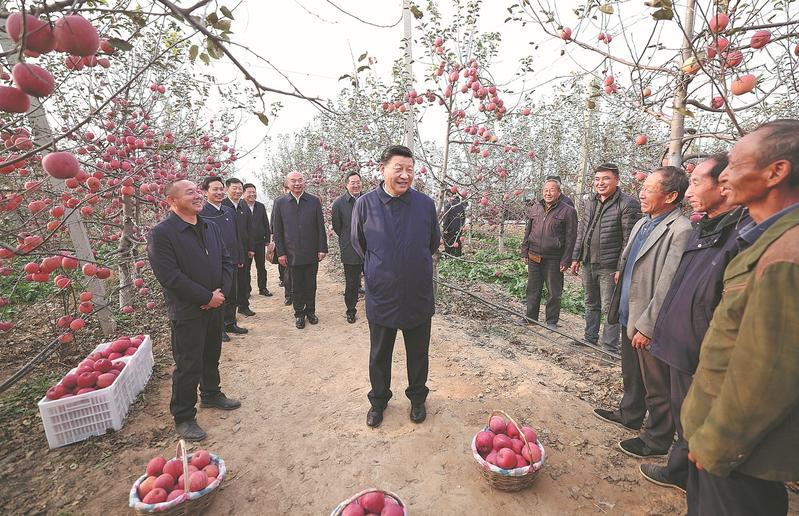 President Xi Jinping, who is also general secretary of the Communist Party of China Central Committee, talks with farmers at an apple orchard in Ansai district of Yan'an, Shaanxi province on Oct 26, 2022 during his three-day inspection trip to Yan'an and Anyang, Henan province, that ended on Friday. (PHOTO / XINHUA)
President Xi Jinping, who is also general secretary of the Communist Party of China Central Committee, talks with farmers at an apple orchard in Ansai district of Yan'an, Shaanxi province on Oct 26, 2022 during his three-day inspection trip to Yan'an and Anyang, Henan province, that ended on Friday. (PHOTO / XINHUA)
President Xi Jinping stressed the need to advance rural revitalization across the board, saying that the most arduous task in building a modern socialist country remains in the countryside.
Xi, who is also general secretary of the Communist Party of China Central Committee and chairman of the Central Military Commission, made the remarks during his inspections of Yan'an in Shaanxi province and Anyang in Henan province from Wednesday to Friday.
During his first inspection tour following the 20th CPC National Congress, Xi urged studying and implementing the guiding principles of the congress, giving priority to the development of the nation's agriculture and rural areas, consolidating and expanding the achievements of poverty alleviation, and making tireless efforts to realize agricultural and rural modernization.
ALSO READ: Xi Jinping leads China on new journey
Xi has special connections with the rural areas of Yan'an — an old revolutionary base that used to be a poverty-stricken area of Shaanxi — as he spent seven years from 1969 living and working alongside farmers in Liangjiahe, a barren mountainous village in Yanchuan county, Yan'an.
Xi stressed that the CPC serves the people wholeheartedly, and it works for the purpose of giving the people a better life
He joined the CPC there and later became village Party chief — marking the beginning of his political career. Xi recalled his earnest wish then was "to make it possible for the villagers to have meat and have it often".
In February 2015, Xi chaired a symposium on poverty alleviation in Yan'an to guide the old revolutionary base in advancing poverty relief work.
On Wednesday afternoon, Xi visited a village in Ansai district of Yan'an, where he wanted to see how local farmers' lives are after they were lifted out of poverty, and how they are advancing rural revitalization.
While talking with local farmers, he recalled the period he spent in Liangjiahe as an "educated youth", and said that he was happy to see the dramatic changes that had taken place in local areas.
Xi learned that local farmers have stable incomes, children enjoy good education, and the elderly benefit from basic medical insurance and their lives keep improving. He said that the changes taking place in the northern part of Shaanxi province are part of the growth of the whole of China.
He encouraged locals to keep working hard to live even better lives.
Xi stressed that the CPC serves the people wholeheartedly, and it works for the purpose of giving the people a better life.
He urged refraining from empty talk, and instead to take concrete action in comprehensively advancing rural revitalization and implementing the Party's policies to benefit farmers in a down-to-earth manner.
READ MORE: Xi calls for advancing national rejuvenation
In Yan'an, Xi also visited a middle school, where he expressed his hope that the school could carry on the "Yan'an spirit" and revolutionary traditions as well as foster talented people that meet the needs of the times.
On Friday morning, Xi visited the Red Flag Canal Memorial Hall in Linzhou city of Anyang. The site is to commemorate the people of Linzhou who built the 70-kilometer canal during the early years of New China in order to solve drought conditions that plagued locals for centuries.
Xi called for carrying on the "Red Flag Canal spirit" to make new contributions along the modernization drive journey. The spirit features "self-reliance, hard work, solidarity and selfless dedication".
He also visited the Yin Ruins in Anyang, a site of the source of the archaeological discovery of oracle bones and an oracle bone script, which resulted in the identification of the earliest known Chinese writing. While there, he called for passing on traditional Chinese culture to firm up cultural confidence.


